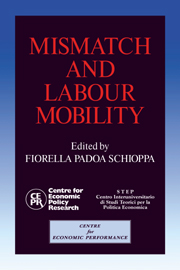Book contents
- Frontmatter
- Contents
- List of figures
- List of tables
- Preface
- Acknowledgements
- List of conference participants
- 1 A cross-country comparison of sectoral mismatch in the 1980s
- 2 Mismatch: a framework for thought
- Discussion
- 3 Match and mismatch on the German labour market
- Discussion
- 4 Mismatch in Japan
- Discussion
- 5 Mismatch and internal migration in Spain, 1962–86
- Discussion
- 6 Regional inequalities, migration and mismatch in Italy, 1960–86
- Discussion
- 7 Skill shortages and structural unemployment in Britain: a (mis)matching approach
- Discussion
- 8 Labour market tightness and the mismatch between demand and supply of less-educated young men in the United States in the 1980s
- Discussion
- 9 Skill mismatch, training systems and equilibrium unemployment: a comparative institutional analysis
- Discussion
- 10 Unemployment, vacancies and labour market programmes: Swedish evidence
- Discussion
- 11 Mismatch and labour mobility: some final remarks
- Index
Discussion
Published online by Cambridge University Press: 05 October 2010
- Frontmatter
- Contents
- List of figures
- List of tables
- Preface
- Acknowledgements
- List of conference participants
- 1 A cross-country comparison of sectoral mismatch in the 1980s
- 2 Mismatch: a framework for thought
- Discussion
- 3 Match and mismatch on the German labour market
- Discussion
- 4 Mismatch in Japan
- Discussion
- 5 Mismatch and internal migration in Spain, 1962–86
- Discussion
- 6 Regional inequalities, migration and mismatch in Italy, 1960–86
- Discussion
- 7 Skill shortages and structural unemployment in Britain: a (mis)matching approach
- Discussion
- 8 Labour market tightness and the mismatch between demand and supply of less-educated young men in the United States in the 1980s
- Discussion
- 9 Skill mismatch, training systems and equilibrium unemployment: a comparative institutional analysis
- Discussion
- 10 Unemployment, vacancies and labour market programmes: Swedish evidence
- Discussion
- 11 Mismatch and labour mobility: some final remarks
- Index
Summary
This study is a notable contribution to a growing literature on pay inequality in the United States, in that it confirms a deterioration of relative pay for less-skilled young males, as opposed to the college-educated, in the 1980s. Freeman's central conclusions are (1) adverse shifts to labour demand for low-skilled males, rather than the reduction of the real minimum wage, deregulation or union busting are responsible; (2) lower migration characterises the less-educated as opposed to the more skilled group; and (3) a generalised tightening of labour markets due to demographic changes forecast for the coming decade should improve the lot of the less skilled.
To my knowledge this study represents one of the first estimates of Blanchflower and Oswald's (1990) ‘wage curve’ with US data. As the Current Population Survey CPS data are arguably the best around, the potential value added of this effort is considerable. Implicit in the inclusion of a North American study in a largely European conference is the ‘benchmark’ value of the US experience. Despite its relatively stationary aggregate unemployment rate, the United States has also suffered its share of terms-of-trade shocks in low-tech manufacturing sectors, which if anything were worse due to their relatively high foreign exposure. The drop in relative wages recorded in the United States may have at least attenuated the decline in utilisation rates (rise in unemployment rates) compared with the Federal Republic of Germany, where relative wage dispersion at the 1-digit industry level has fallen since the mid-1970s (Burda and Sachs, 1988).
- Type
- Chapter
- Information
- Mismatch and Labour Mobility , pp. 382 - 385Publisher: Cambridge University PressPrint publication year: 1991
- 1
- Cited by



